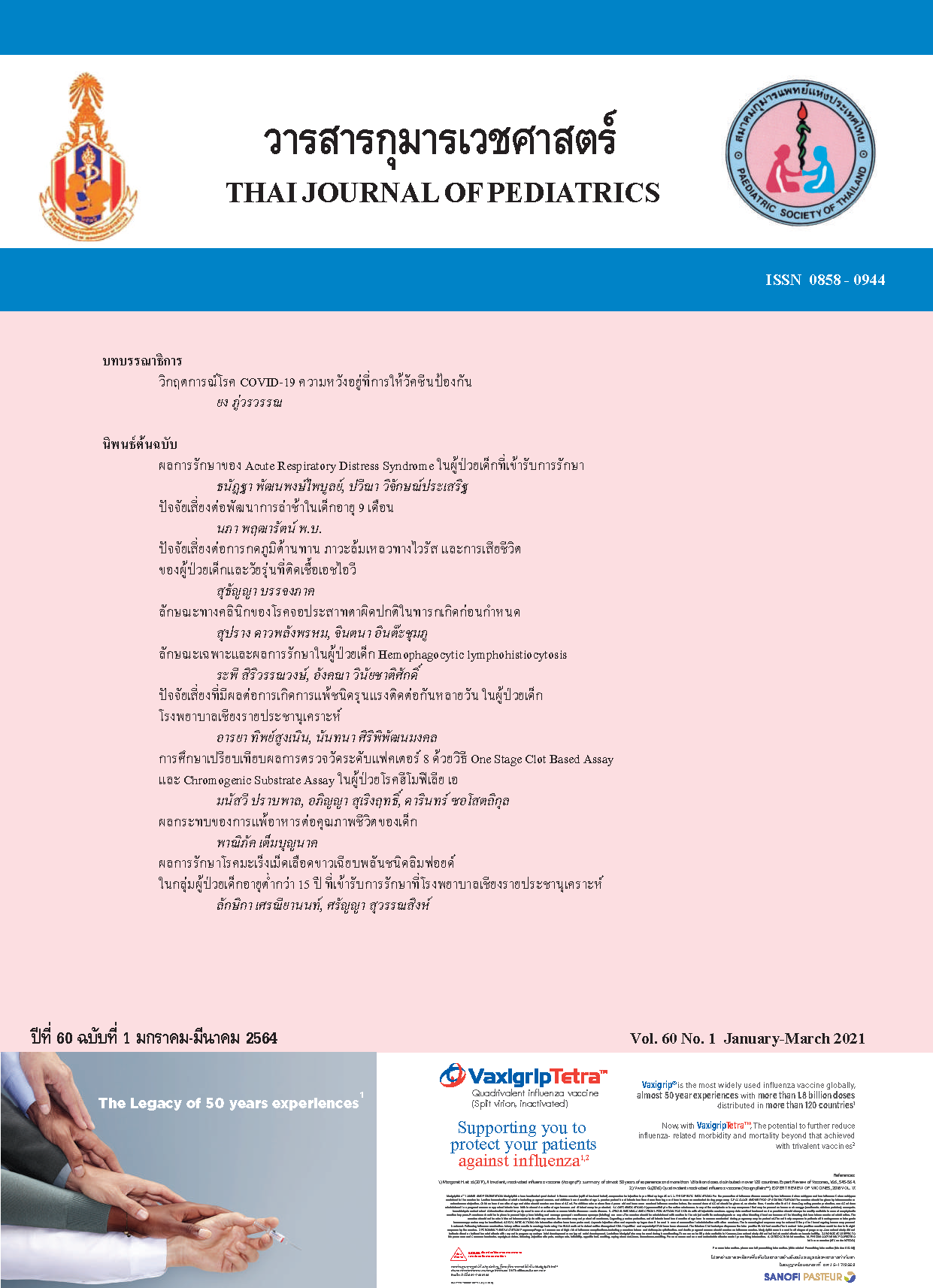Factors Affecting Developmental Delay in 9-month-old Children
Keywords:
Delay development, child, risk factorAbstract
Objective : To study factors related to developmental delay in 9-month-old children at Health Promotion Center Region 5
Method : This was a retrospective descriptive research. Children records in Health Promotion Center Region 5 Ratchaburi Hospital during January 1, 2017 to December 31, 2019, were reviewed. Data were collected including maternal data , children data , child development data . Factors that related to developmental delay in 9-month-old children using were analyzed by chi square test.
Outcome : A total of 2,140 patients were included. 98% of the children had a normal social development, 93.4% of the children had a normal fine motor development, 85.5% of the children had a normal gross motor development. 85.9% of the children had a normal language development and 71.1% of the children had normal overall development. The results of analysis the relationship between various factors and development showed that childhood underlying disease was associated with social development. Neonatal hypoglycemia and childhood nutrition was associated with fine motor development . Childhood underlying disease, storytelling activities was associated with gross motor development. Gestational age, birth weight, childhood underlying disease, storytelling activities was associated with language development. And Gestational age, birth weight, childhood nutrition was associated with overall development.
Conclusion : Factors related to developmental delay in 9-month-old children at Health Promotion Center Region 5 was gestational age , birth weight , neonatal hypoglycemia , childhood underlying disease, childhood nutrition and storytelling activities.
Downloads
References
Mayers R. The twelve who survive: strengthening programmes of early childhood development in the third world. London:
Routledge, 1992.
Health Promotion Bureau, Department of Health, Ministry of Public Health. 2013.
World Health Organization. 2012.
สำนักส่งเสริมสุขภาพ. รายงานการสำรวจพัฒนาการเด็กปฐมวัยกรมอนามัยประจำปี 2560. เอกสารอัดสำเนา.
นิชรา เรืองดารกานนท์. พัฒนาการและเชาว์ปัญญาของเด็กไทย. 2551.กรุงเทพฯ .เอกสารอัดสำเนา.
Bhutta ZA, Guerrant RL, Nelson III CA. Neurodevelopment, Nutrition, and Inflammation: The Evolving Global Child Health Landscape. Pediatrics. 2017;139
ธันยพร เมฆรุ่งจรัส และอดิศร์สุดา เฟื่องฟู. ปัจจัยที่กระทบต่อพัฒนาการเด็ก. ใน : สุรีย์ลักษณ์ สุจริตพงศ์และคณะ, บรรณาธิการ. ตำราพัฒนาการและพฤติกรรมเด็ก เล่ม 4.กรุงเทพฯ:พี.เอ.ลีฟวิ่ง จำกัด, 2561: 44.
Bernardo L. Horta, Cesar G. Victora. Longterm effects of breastfeeding. Department of Maternal Newborn Child and Adolescent Health (MCA). World Health Organization. Switzerland. 2013: 74.
นันทา อ่วมกุล และคณะ. สุขภาวะของเด็กและวัยรุ่นไทย พ.ศ. 2552. บริษัท บียอนด์ เอ็น เทอร์ไพรซ จำกัด, 2552.
Wendy H.Oddy, JianghongLi, Monique Robinson, Andrew J.O. Whitehouse. The Long-Term Effect of Breastfeeding on Development. Centre Population Health Research. Contemporary Pediatrics. Publisher InTech 2012 : 57-78.
Isaranurug S, Nanthamongkolchai K, KaewsiriD. Factors Influencing development of children aged one to under six years old.
J Med. 2015.
ณัฐพร ทัศนกิจพาณิชย์. การประเมินพัฒนาการเด็กและแนวทางในการประเมินเด็กที่มาด้วยปัญหาทางพัฒนาการ. คณะแพทยศาสตร์มหาวิทยาลัยสงขลา
นครินทร์. 2561
ปรียนุช ชัยกองเกียรติ. ปัจจัยที่มีความสัมพันธ์กับพัฒนาการล่าช้าของเด็กปฐมวัย. วารสารมหาวิทยาลัยยนราธิวาสราชนครินทร์. 2561;5(2): 161-171.
Kanlaya, A. The Study on Delayed Developmental Problems in Newborn to 5 Years Found in Queen Sirikit National Institute of Child Health. Thesis Diploma in Professional Medicine, Pediatrics, The Medical Council of Thailand. Bangkok: National Institute of Child Health, Ministry of Public Health. 2018.
ไสววรรณ ไผ่ประเสริฐ และคณะ. ปัจจัยที่มีอิทธิพลต่อพัฒนาการเด็กวัยแรกเกิดถึง 3 ปี ในเขตตรวจราชการสาธารณสุขที่ 18. วารสารกุมารเวชศาสตร์
ตุลาคม - ธันวาคม 2556. :286-294
Loesathienkit P. Situation of Thai early childhood development. Public Health Region 3 Chonburi, Bureau of Health Promotion, Department of Health; 2015. (in Thai)
Wickström R, Skiöld B, Petersson G, Stephansson O, Altman M. Moderate neonatal hypoglycemia and adverse neurological development at 2-6 years of age. Eur J Epidemiol. 2018;33:1011-1020.
ศิริกุล อิศรานุรักษ์, สุธรรม นันทมงคลชัย, ดวงพร แก้วศิริ. รายงานการวิจัยโครงการการ พัฒนาระดับสติปัญญาเด็กวัยต่างๆ ของประเทศระยะที่ 1 : การวิเคราะห์สถานการณ์.คณะสาธารณสุขศาสตร์. มหาวิทยาลัยมหิดล. 2544.
Kumraksa, N., Theeranan, P., Srihirunrussame, S., Keodsawas, A. & Kuhapun, B. Situation of Child Development Promotion. Journal of
Mental Health of Thailand. 2014;22: 76-83.
Chaimay, B., Thinkhamrop, B. & Thinkhamrop, J. Risk Factors Associated with Language Development Problems in Childhood – A Literature Review. J Med Assoc Thai. 2006;89:1080-1086.
Pattanapongthorn, J., Boonsuwan, C. & Thanajaroenwatchara, N. The Study of Thai Early Child Development. Retrieved August, 28 2016.
บำเพ็ญ พงศ์เพชรดิถ, บุษบา อรรถาวีร์.ปัจจัยที่ส่งผลต่อพัฒนาการเด็กปฐมวัยไทย. วารสารเกื้อการุณย์; 2563 ; 27: 59-70
พนิต โล่เสถียรกิจ. เด็กพูดช้า. วารสารกุมารเวชศาสตร์ ปที ี่ 26 ฉบับที่ 4 ตุลาคม-ธนั วาคม 2550.
Rojanaritphichet S. Tales and IQ and EQ development. 2015 [cited 2018 May 21]. Available from: https://blog.mcp.ac.th/?p=58328 (in Thai)
Downloads
Published
How to Cite
Issue
Section
License

This work is licensed under a Creative Commons Attribution-NonCommercial-NoDerivatives 4.0 International License.



